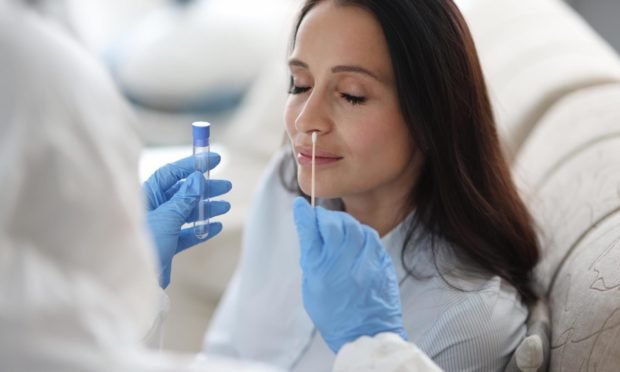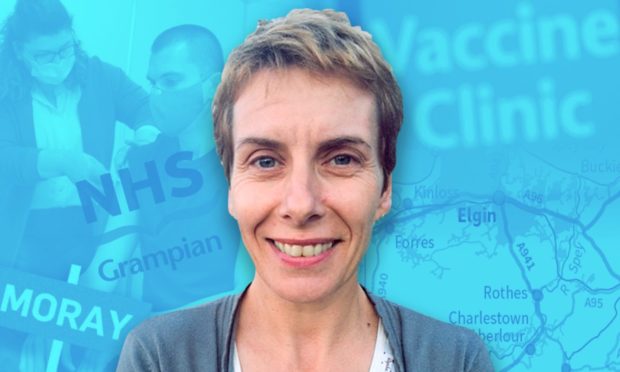NHS Grampian will introduce enhanced Covid testing across three communities to tackle the surge in cases.
Additional testing will be made available for residents in Tillydrone and Froghall in Aberdeen, as well as for people living in Elrick and Westhill.
Anyone who is feeling in anyway unwell, as well as those experiencing “classic” Covid-19 symptoms – such as a cough, fever or loss or taste of smell – is being asked to book a PCR test.
Asymptomatic testing will also be available for those without any symptoms.
High number of Covid cases are accelerating
Jillian Evans, head of health intelligence at NHS Grampian, said these measures are aimed at halting the spread of the virus and easing a third wave of infections.
Ms Evans, who last week warned a surge would have a “serious” impact on the health board, said: “These areas are seeing a high number of cases and, from the data, this appears to be sustained and accelerating.
“If everyone pulls together in these areas now and comes forward for testing, we hope to keep it under control.
“We saw recently with the surge in Moray cases the part that asymptomatic testing has in breaking chains of transmission and ensuring as few people become infected as possible.
“We want to keep any third wave as small as possible in Grampian and, alongside the vaccine rollout, our best weapon against the virus is testing.”
The case positivity rate in Tillydrone currently stands on nearly 988 cases per 100,000 people, while there are 470 cases in the Froghall area.
Meanwhile, the latest figures show nearly 1,351 cases per 100,000 population in Westhill and Elrick and 393.4 cases in Westhill Central – making it the highest in Scotland over the last week.
In Aberdeen City and Aberdeenshire the figures are 127.7 and 54.4 respectively, while the national figure for the whole of Scotland is 139.9.
Community effort plays big part in halting the spread of the virus
Ms Evans added: “Recently in Moray when we expanded testing to fight the surge in cases, thousands of people came forward and we quickly found that around 50% of cases were showing no symptoms.
“These people were unknowingly walking around potentially spreading the virus to others – those could be vulnerable people who are unable to get the vaccine due to medical issues or someone else who could be badly effected by catching Covid-19.
“The people who came forward played their part in protecting their families, their friends, their local communities, their local NHS.
“People coming forward for asymptomatic testing when they feel well or undertaking LFD testing at home is key in keeping cases in the region down.
“Get tested, get vaccinated and protect your community. No one is safe until everyone is safe.”
Public health consultant Derek Cox has also warned case numbers in Grampian could return to levels seen in January if they are not brought under control and said, regardless of hospitalisations, high case numbers could adversely impact on the NHS locally as staff have to self-isolate, due to cases in the community.
‘Societal effect from a third wave could be huge’
He said: “At the moment, modelling suggests that we could have 300 cases per day in Grampian in the coming weeks – if cases are spread equally around Scotland.
“That’s as bad as it was in January, when contact tracing was badly impacted due to the sheer volume of work.
“However we can avoid these problems if people take up the vaccine, undertake asymptomatic testing, social distance, wash hands and wear a mask.
“Some people seem to think we are past the pandemic and are safe – we are not.
“People need to be paying more attention to long Covid, as a significant number of younger people, who are being affected now, are suffering from long Covid – that can affect their ability to work and we are seeing cases which have lasted more than a year.
“In other areas with higher cases number across the UK we are seeing higher numbers of young people being admitted to hospital.
“The societal effect from a third wave could be huge, even if hospital number and deaths are lower.
“A peak means more people have to self-isolate – that can mean teachers, doctors, nurses, firefighters, police officers and anyone else in society – may not be able to work for ten days at a time.
“From a NHS point of view this can have a significant impact on our staffing at a time when we are trying to remobilise and get through growing waiting lists.”

